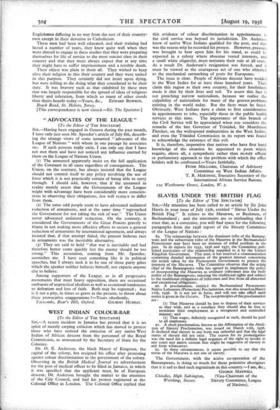SLAVES UNDER THE BRITISH FLAG
[To the Editor of THE SPECTATOR]
SIR,—My attention has been called to an article by 'Sir John Harris in your issue of July 15th, entitled " Slaves Under the British Flag." It relates to the Masarwa, or Bushmen, of Bechuanaland ; and the statements are so misleading that I trust that, as a corrective, you will find space for the following paragraphs from the 1938 report of the Slavery Committee of the League of Nations : 89. The relationship between the dominant tribe of the Bamang- wato and the subservient tribe of the Masarwa in the Bechuanaland Protectorate may have been an instance of tribal serfdom in the past. In its reports for 1935, 1936 and 1937, the Committee pub- lished particulars of this relationship supplied to it by the United Kingdom Government. This year, it has received a communication containing detailed information of the greatest interest concerning the action taken by the Protectorate Government to protect the interests of the Masarwa. The Committee observes that the acting chief of the Bamangwato tribe has agreed to implement the policy of incorporating the Masarwa as ordinary tribesmen into the body politic of the Bamangwato, enjoying the traditional right's and subject to the traditional obligations of tribesmen and free from all abnormal
and. exceptional ,obligations. •
9o. A proclamation, entitlei the Bechuanaland Protectorate Native Labourers (Protection) Proclamation was also. issued 11th, 1936. It is not yet in force, and' Will not take effect until notice is given in the Gazette. The two principles of this proclamation are :
(i) That Masarwa should be free to dispose of their services as they wish, and as a corollary they should also be free to terminate their employment in a recognised and controlled manner, and
(a) That wages, definitely recognised as -such, should be paid to all employees.
91. A short proclamation, known as the Affirmation of the Aboli- tion of Slavery Proclamation, was issued on March 11th, 1936. It declared that slavery in any form was unlawful and that the legal status of slavery did not exist. The reason for its promulgation was the need for a definite legal negation of the right to invoke in any court any native custom that might be suggestive of slavery in any form whatsoever.
92. In these circumstances, it seems possible to say that the status of the Masarwa is not one of slavery.
The Government, with the active co-operation of the Bamangwato, is doing so much for these primitive aborigines that it is sad to find such ingratitude in this country.—I am, &c., GEORGE MAXWELL
Worthing, Sussex. Slavery Committee, League of Nations).






































 Previous page
Previous page